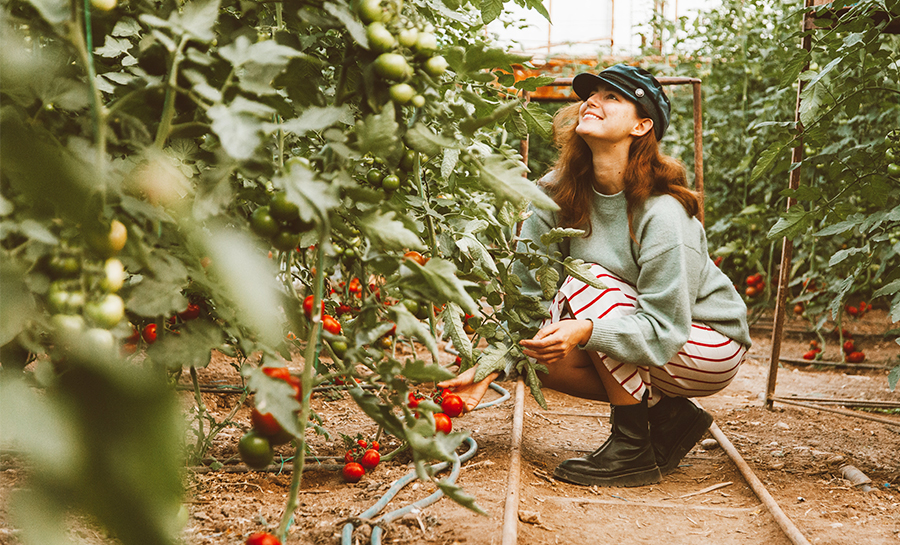
[adinserter block=”1″]
One of the best ways to take advantage of the riches of seasonal produce while supporting your local farmers and knowing exactly where your food comes from, is with community-supported agriculture, or CSAs as they’re commonly known.
The opposite of local farmers and community agriculture is the large-scale agriculture that often wipes out the smaller farmers trying to make a living. What often comes with large-scale agriculture is a decrease in quality, higher emissions from transporting food long distance (resulting in decreased freshness), a higher rate of pesticide use, and putting money into the pockets of corporations instead of family farms.
As consumers, we vote with our dollars and we have a choice in who and what we support. So if supporting your local farmers and knowing where your food comes from, community-supported agriculture (CSA) is an excellent and impactful option!
If you’ve ever wondered exactly what a CSA is, the benefits, or how to get involved in your town, read on.
There are major benefits to buying produce when it’s in season. Here’s Your Guide to Seasonal Produce + 5 Benefits of Buying Vegetables and Fruits In Season
What is Community-Supported Agriculture?
Community-supported agriculture is built around the idea of increasing local consumers’ access and connection to local food – a win-win for all parties, especially in a society where we’re increasingly disconnected from our food and the humans behind it.
Community-supported agriculture benefits local farmers, expands your palate, and inspires meal creativity.
The USDA defines community-supported agriculture as “a community of individuals who pledge support to a farm operation so that the farmland becomes, either legally or spiritually, the community’s farm, with the growers and consumers providing mutual support and sharing the risks and benefits of food production.”
In a more practical sense, this looks like individuals who buy a “share” of a farm or group of local farmers, often as a lump sum or monthly payment, and in exchange receive a regular share of the harvest weekly throughout the growing season.
There’s no official count on the total number of community-supported agriculture programs in the country, but it’s well into the thousands and growing, as more people become interested in connecting with their local food scene.
And as popularity grows, so do the options. Many programs offer options like half shares for smaller households, mix-and-match or choose your own bundles, or a catalog including everything from eggs to cheese, baked goods, dry goods, flowers and more.
What Are the Benefits of Community-Supported Agriculture?
For most of us, stocking up on produce looks like a run to the nearby supermarket or an Instacart delivery, and to be clear – there’s absolutely nothing wrong with that (here are a few great delivery services, in fact).
There are so many challenges to food access in terms of inequity, affordability and societal messaging around food – so everyone should feed themselves in the way they’re able and that’s right for them.
Having said that, if you’re able to participate in community-supported agriculture, the benefits are multifaceted both for you and the farmers and food producers on the other end.
By buying into community-supported agriculture (more details on that, further down), you’ll be receiving a vibrant selection of goodies each week that will expand your palate, introduce you to a diverse range of produce at its peak freshness, and help you get more creative in the kitchen.
Reduce Your Food Waste With This Simple 6-Step Guide to Home Composting
Small farmers often struggle to stay above ground financially, especially in today’s culture of large-scale agriculture and subsidized crops. So by buying a share in community-supported agriculture, you’re providing vital, up-front support to the farmers in your own hometown, who are then in turn able to provide their goods at an affordable rate direct to the consumer.
There are also significant environmental benefits of community-supported agriculture. Large scale, conventional farming tends to practice monocrop agriculture, rely heavily on fertilizers and pesticides, and other commercial farming practices that deplete the soil and health of the land.
Local farmers, on the other hand, tend to practice more sustainable, eco-friendly farming practices that improve the health of their land.
And when offering a CSA, farmers tend to grow a wider variety of crops, which in turn brings benefits to the soil and ecosystem.
And since community-supported agriculture offers local pickups and sources items from a small local radius, your food doesn’t have to travel thousands of miles to your plate – cutting down on its carbon footprint, not to mention delivering you a much fresher, more-nutrient packed haul.
And last but not least, is there anything better than a fresh tomato? The difference in taste alone is reason enough to join community-supported agriculture.
Your Guide to Seasonal Produce + 5 Benefits of Buying Vegetables and Fruits In Season
How Do You Get Involved?
Heard enough and ready to make this year your era of community-supported agriculture? It’s increasingly easy to find a CSA near you and join!
A good starting point is simply to Google “community-supported agriculture near me,” to find your local options. Many cities will put out publications of local CSA options, or you can always contact your county extension office for pointers.
The USDA puts out a local food directory site, where you can search by location for community-supported agriculture options near you (though you might fare best with local guides or lists, as we’ve found this site is not always totally up to date.)
Local Harvest puts out another online CSA database that tends to be heavily used by farmers and will likely show you a more complete list of options near you.
Enjoy Yummy Locally Sourced Food With Your Community-Supported Agriculture (CSAs)
If you’re looking for a way to plug into your local economy, build relationships with the growers and producers who make your food, enrich your diet and build a more transparent relationship to your food, there’s no more effective or delicious way to do it than through community-supported agriculture.
Early spring tends to be the main sign-up season, so find your CSA and look forward to a bounty in the coming months!
Looking for the yummiest recipes to use with your CSA haul? Here Are the Best Healthy Food Blogs of 2023 (You’ll Want to Bookmark These)
[adinserter block=”1″]
Credit : Source Post






